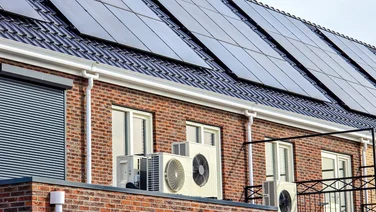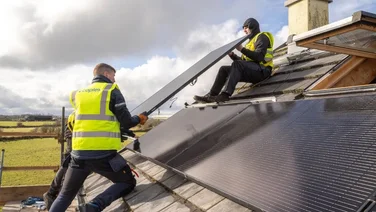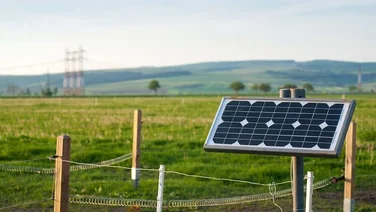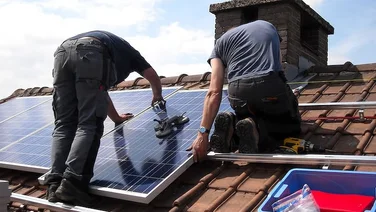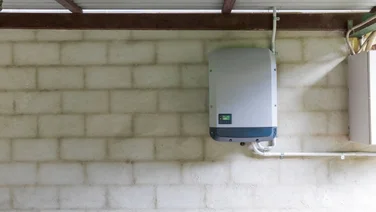- There are many solar panel grants and funding schemes around the world
- Grants can help homeowners afford the up-front costs of solar panels
- Some grants cover the entire cost of a solar panel system installation
- Tax-free incentives help encourage more people to switch to solar

Governments around the world offer grants and initiatives to encourage solar panel installation
Solar panels are one of the most important tools we have in the fight against climate change. They shrink emissions, reduce reliance on fossil fuels, and help save money on energy bills.
Governments around the world have made it easier to install solar panels through either grants or tax-free incentives.
In this guide we will cover some of the most popular solar panel grants, schemes, and incentives around the world.
United Kingdom

There are several solar panel grants and schemes available in the UK, which make it easier to afford a solar panel system and to profit from excess electricity generated by them.
Some schemes provide complete funding for a solar panel system, whereas others allow homeowners to join a group-buying initiative, such as solar together.
While we have outlined the grants and funding schemes available in our guide, let’s briefly go over the existing options here:
UK: Smart Export Guarantee
The Smart Export Guarantee (SEG) allows solar panel owners to export any excess electricity back to the grid for profit. Most people only use around 50% of the electricity their solar panels generate after all, so it’s definitely worth selling the electricity you don’t use.
You generally won’t make a huge amount with the SEG, but rates have been climbing over the years — right now, the best SEG rate available is 27p per kilowatt hour (kWh).
On average, a UK household will make around £160 a year with the SEG, which is still a reasonable amount off your energy bills.
0% VAT on solar panels
People buying solar panels in the UK will pay 0% VAT, which is a huge discount considering the high upfront costs of solar panels.
You’ll need to act fast though, as the 0% VAT on solar panels ends in April 2027, when it will revert back to 5% VAT. With the average UK domestic installation in 2024 costing £9180, that extra 5% will make a difference — an extra £459 to be exact.
0% VAT on solar batteries
Like with solar panels, you’ll pay 0% VAT on solar batteries if you live in the UK. This came into effect in February 2024 and will continue until 31 March 2027. Prior to this, you could only get solar batteries with 0% VAT if you purchased one alongside a solar panel system.
Otherwise, you’d pay 20% VAT which could add a substantial amount to the total cost of a solar battery.
Storage batteries are a great way to not only reduce your emissions, but to store the electricity your solar panels generate during the day for use at night.
ECO4
ECO4 is the fourth phase of the Energy Company Obligation (ECO), which is a government-funded scheme designed to make UK homes more energy efficient. Crucially, it seeks to alleviate fuel poverty.
ECO has been in effect since 2013, and has helped provide 3.1 million home improvements. ECO4 can help households get access to solar panels, but only if they’re:
- Heated by an electrical heater
- Are unable to get a biomass boiler or heat pump
You can read more about the ECO4 scheme with our guide.
Ireland

If you live in Ireland and want to install solar panels, there are several grants and schemes available to make it easier. These include the Solar Electricity Grant and the 0% VAT on solar panels initiative, both of which help homeowners better afford a solar panel system for their property.
Here are your options for solar panel grants and schemes if you live in Ireland:
Solar Electricity Grant
You can potentially claim up to €2,100 off the total cost of solar panels by applying to the Solar Electricity Grant. How much you get towards a solar panel system is dependent on the kilowatt peak (kWp) output of the system, but regardless of kWp, the maximum available grant is €2,100.
The grant scales as follows:
- €800 per kWp up to 2 kWp (€1600 for 2kWp solar panels)
- €250 for every additional kWp up to 4 kWp (total grant capped at €2,100)
The government of Ireland has set aside an impressive €380 million in total to be claimed, but you should still act fast to see if you’re eligible for a discount.
Who is eligible for the Solar Electricity Grant?
There is a good deal of flexibility for who is eligible for the Solar Electricity Grant, with all homeowners (including private landlords) being able to apply.
You’ll still need to have had a house that was built and occupied before 31st October 2020 though, and have not previously had any funding for solar panels.
How do I apply for the Solar Electricity Grant?
Applying for the Solar Electricity Grant in Ireland requires the following steps:
- Find and appoint a registered SEAI solar PV company
- Get around four quotes from different registered companies
- Research the company you choose and read references
- Make sure that the company is on the SEAI register
- Check that you have a contract in place
- Apply to SEAI for your grants offer
- Get the solar panels installed
0% VAT
Like in the UK, solar panels in Ireland are subject to 0% VAT, which can help people looking to buy a solar system save around €1,000. The 0% VAT scheme was introduced in May 2023 and is designed to help “families and businesses deal with high energy prices and cost of living challenges,” according to the Irish government.
This also helps reduce the payback period of solar panels, according the government:
“At €0.32c per KWh, this will reduce the payback period for installation from 7 to 6.2 years.”
One caveat is you’re required to use the same company for both supplying and installing the solar panels. If you decide to use different companies, the previous 13.5% VAT rate will still apply, so it’s generally best to use one company.
Clean Export Guarantee
There’s also the Clean Export Guarantee (CEG) scheme, which pays households for each kilowatt of solar energy they export to the grid. This is great for households who are otherwise letting the excess electricity their solar panels generate go to waste.
With the CEG, you’ll get roughly 24c per kWh (based on export rates from the six suppliers currently offering a CEG tariff. What’s more is you might not even have to pay tax on this income, as homes can get up to €400 in tax-free payments each year for renewable electricity.
Sweden

There are several incentives available for people in Sweden looking to install solar panels. Solar panels in Sweden are incredibly effective — the country receives more than 18 hours of sunshine in the height of summer which is ideal for solar panels.
Here’s your options for solar panels incentives if you live in Sweden:
Green Deduction (Gron Teknik)
The Green Deduction (Grön Teknik) is a tax incentive that directly applies a reduction to the total cost of a solar panel system. It offers people in Sweden looking to install solar panels a maximum reduction of 50,000 SEK per person per year (around £3,500).
The incentive applies to any installations started, paid for, and completed no earlier than 1st January 2021. It’s a flat 20% reduction for solar panel installations, and a mighty impressive 50% on solar batteries.
How it works is the company installing your system will automatically apply the tax reduction to your invoice. They’ll then apply for payment from the Swedish Tax Agency.
Who is eligible for the Green Deduction?
You’ll be eligible for the Green Deduction if you’re installing solar panels, solar storage batteries, or electric car charging points for your home. These installations must be done for either your own home, your parent’s home, or a property being built that you own.
Qualifying home types are:
- A detached house
- A condominium owned by your
- An apartment you’ve been given permission to use
ROT tax deduction
ROT allows people in Sweden to get a tax reduction on certain types of work done on their homes. It can be used for solar panel installations and homeowners can claim up 9% off the total cost.
This makes ROT generally not quite as beneficial as the Green Deduction, which is much larger, but if your solar panel and/or solar storage installation is particularly big, then ROT might be better.
France

There are several schemes and initiatives for people living in France looking to install solar panels. If you own a second home in France, then the available schemes could be really useful.
The Self-Consumption Bonus
The Self-Consumption Bonus scheme in France is designed to help homeowners who generate electricity with solar panels get money for excess electricity exported to the grid. You can sign up for this bonus and export excess electricity via EDF.
Some applicants can cut their electricity bill by as much as 30%. How much you can make depends on several factors, such as when your solar panels were installed. If your system was installed between 1st November 2022 and 31st January 2023, the maximum amount you can make each year is 480 euros per kilowatt installed up to three kWp.
Installations completed after 1st February 2023 can get up to 500 euros per kilowatt installed, up to three kWp, then a further €370 afterwards.
If you’re signed up for the Self-Consumption Bonus, you’ll get paid on the anniversary of your solar panel system’s installation date.
Who is eligible for the Self-Consumption Bonus?
To qualify for the Self-Consumption bonus, your solar panels must be on your roof and have been installed by an RGE (Reconnu Garant de l’Environnement) company).
The Purchase Obligation Scheme
Solar panel owners in France can sell excess electricity to the French government (through supplier EDF) under The Purchase Obligation Scheme. This helps solar panels owners recoup some of the costs of their system, and shrinks the break-even point.
What you’ll get paid for the energy sold is set by public authorities (CRE) and changes each quarter, ranging from 0.0803 €/kWh to 0.2395 €/kWh (depending on the size of the system).
You can choose to sell some or all of the electricity you generate, with the latter option offering higher rates. With The Purchase Obligation Scheme, you can expect to save around €2,000 throughout a 20-year contract.
Who is eligible for The Purchase Obligation Scheme?
To be eligible for The Purchase Obligation Scheme, you must meet some or all of the following criteria:
- Have a solar panel system with a power output of 500 kWp or less
- Installed solar panels on the roof of a building, shed, shade house (includes agricultural greenhouses, courtyards, buildings for housing and/or sheltering animals)
- Have a carbon footprint of less than 550 kg CO2 eq/kWp for installations greater than 100 kWp output
10% VAT
If you have a solar panel installation of 3 kWp or less, you’ll pay a reduced rate of 10% VAT (normally 20% VAT). Installing thermal or hybrid solar panels purely for the purpose of heating a home means paying just 5.5% VAT.
Spain

Spain has several schemes and benefits for installing solar panels that can make doing so pretty appealing. Couple that with the fact that Spain has lots of sun throughout the year, which can make it beneficial to add a solar system to your home.
IRPF (income tax) reduction
IRPF is income tax in Spain and you can get cut what you pay by up to 60% by installing solar panels, depending on your region and energy efficiency.
The maximum of 60% is only available for a solar installation that reduces a property’s consumption of non-renewable energy by at least 30%, or helps a property achieve an A or B energy rating.
To meet the minimum 20% reduction, a solar panel installation must reduce a home’s consumption of non-renewable energy by at least 7%.
You can get a maximum rebate of €9,000 on the total cost of €15,000 for a solar panel system over four years.
Who is eligible for IRPF?
To be eligible for IRPF, you must meet some or all of the following criteria:
- Have installed a solar panel system before December 2024
- They must be installed on your primary residence
- Your solar system must’ve been installed by a certified installer
- The post-installation Energy Efficiency Certificate has to be issued before 1st January 2025
Czechia

If you’re looking to get solar panels in Czechia (also known as the Czech Republic), there are schemes available that can help make it a little easier.
New Green Savings scheme
As of September 2023, homeowners in Czechia can apply for the New Green Savings scheme, which offers grants ranging from 60,000 CZK (roughly £2,000) to 200,000 CZK (about £6,900) to finance solar panel installations. How much you get depends on the size of the system too.
There are also additional grants available depending on location. For example, Karlovy Vary, Moravian-Silesian, or Ústí Region homeowners can receive a bonus of 10% of the total amount of the subsidy.
Who is eligible for the New Green Savings scheme?
To be eligible for the New Green Savings scheme, you must meet at least one of the following criteria:
- Be the owner or builder of a home and/or apartment building. This covers both individuals and legal entities.
- Be part of a state organisation or state-subsidised organisation responsible for building institutions
Germany

Germany offers people looking to install solar panels several schemes and initiatives to help make it a little easier.
Here’s a brief overview of your options in Germany:
Feed-in tariff
Germany introduced a feed-in tariff in 2000 as part of its Renewable Energy Act (EEG), which was created to encourage greater adoption of green technologies such as solar panels.
As of October 2023, solar panel owners in Germany can sell their excess electricity back to the grid for 8.20c per kWh. The power output of solar panel systems exploring back to the grid is capped at 10 kWp.
With a 10 kWp solar system, you stand to make up to €800 from exporting excess electricity.
0% VAT
In January 2023, Germany introduced a 0% VAT initiative on new solar panel installations. With this initiative, homeowners can potentially save up to €3,500 on the cost of a solar panel system.
The 0% VAT rate isn’t for all solar panel installation, as some requirements need to be met:
- The solar panels must be installed on or near private residences
- The solar system cannot exceed a power output of 30 kWp
- The installation must be completed after January 2023
Norway

Thinking of installing solar panels in Norway? There’s the Enova solar grant that can help make the process of purchasing the solar system easier.
Enova
Homeowners in Norway can get NOK 7,500 (£550 or so) to help support the installation of solar panels. You’ll get an additional NOK 1,250 per kWp of installed power, up to a maximum of 20 kW. This amounts to a total of NOK 32,500 (a little under £2,400).
You don’t get money off before the installation is complete — rather, once your panels are installed and paid for, you register the costs with Enova.
Here are the eligibility requirements for Enova:
- The installation must be initiated, implemented, and paid for by you as an individual
- To receive support, the system must have been purchased and installed within the last 12 months
- The installation must be carried out by a registered company
- The work must be carried out by professionals who have the necessary education and authorization
- Cannot receive other public support
- Must be the legal owner of property
Switzerland

Homeowners in Switzerland looking to install solar panels can turn to the KLEIV grant, which makes solar systems more affordable by providing funding. There’s also a feed-in tariff available to help further shrink the costs.
Let’s look at the details:
KLEIV
The Swiss government offers a one-off payment for small photovoltaic systems (KLEIV) with an output of less than 100 kWp. It will provide up to 30% of the installation cost, which can shave thousands off the price of a solar panel system.
Homeowners installing a 10 kWp system for example, will get a grant of around 4000 CHF (£3,800) towards the installation cost.
Considering the standard solar panel system for a typical Swiss home is between 5 and 10 kWp, you’ll almost definitely qualify for the payment.
For the feed-in tariff, a 10 kWp system will earn homeowners around 1,750 CHF (£1,500) a year from selling excess electricity back to the grid. This is assuming a typical feed-in tariff rate of around 25c per kWh.
Austria

If you’re a homeowner in Austria and are looking to install solar panels, there are several incentives available to make it a little simpler.
Solar bonus
The Austrian government set aside an impressive €940M to help homeowners save money on solar panel installations, as part of its ‘Get Out Of Oil and Gas’ initiative. Homeowners installing solar panels will be able to save an average of €1,500 when installing solar panels alongside a new boiler system.
As of November 2023, the Austrian government has already approved 2 gigawatts of solar power, amounting to roughly 121,000 successful applications to its solar bonus scheme.
Sales tax exemption
As of January 2024, the Renewable Energy Expansion Act (EAG) has been replaced by a sales tax exemption for solar panels and batteries up to 35 kWp.
The previous VAT for solar panels in Austria was 20%, so the sales tax exemption will save homeowners roughly €1,906 for a 5.5 kWp system (without battery storage). Normally, Austrian homeowners would pay an average of €11,431 for a system this size.

